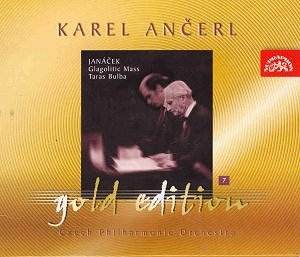Many listeners now
entering their fifties and sixties (and
I suspect quite a few others) will have
imprinted on these versions. They will
have heard them on various Supraphon
LPs from the sixties and seventies.
Of course there have been other versions
- quite a few in fact. Very few, however,
have been able to hold a torch to the
fervour that burns through the Ančerl
recording.
In the case of the
Glagolitic Mass listen
to the choir at 4.24 in the Gloria.
The orchestra had been coached to unanimous
perfection over four days yet without
a virile liveliness of expression being
drilled out of them. While Domanínská
and Soukoupová suffer some squall and
hardness in their voices their singing
has forbidding commitment. The organist
Jaroslav Vodrážka brings a vehemence
that is little short of vicious in the
Credo. This is offset by the honeyed
choral calls of 'veruju' at 8.49.
As for the desperation in exultation
that suffuses the Intrada/Exodus
it
has not in my experience been repeated.
Although a trace of hardness is apparent
this is a small and a soon perceptually
vanishing price to pay for the special
poise Ančerl was able to
strike between fervour and precision
in this classic of the gramophone.
Compare Kempe on Decca,
Bernstein on Sony, even Rattle on EMI.
Although I usually reject the primacy
of national interpreters the Czechs
provide the strongest examples in the
case of the Glagolitic Mass. Kubelik
with Bavarian forces is good as also
is Neumann and Mackerras (Supraphon)
and Bakala's historic recording is highly
regarded. Leoš Svarovsky's Ultraphon
CD (UP 011-2 231) has also been feted
recently on the r.m.c.r. newsgroup.
Also
a landmark is Ančerl's recording
of Taras Bulba based
on the novel by Gogol. Its usual stable-mate
is the Janáček Sinfonietta,
a work which overshadows Taras in
the quality of its invention - melody
and treatment. Here Ančerl is yet
again a pioneer. For many years it was
the only version available. In the 1980s
the Janáček revival put an end
to all that. Although deservedly less
popular than the Sinfonietta
there is still plenty of opposition.
The most effective is from Kubelik (Bavarian
Radio) on DG but Mackerras (Vienna Philharmonic)
on Decca is also a doughty contender
though rather too refined for my tastes.
For me the definitive version is to
be found on Reference Recordings. Stokowski
protégé, Jose Serebrier
recorded the Sinfonietta, Taras,
various poems, opera preludes, suites
and fantasies with the Czech National
Radio Orchestra all captured in state
of the art sound. Those two discs are
now available at two for the price of
one - a stunning bargain.
Returning to this classic
Supraphon
issue, it was recordings such as these
that prompted the Toronto Symphony's
governing board to invite Ančerl
to become the orchestra's principal.
Resplendent in its
24 bit digital remastering this offers
the best compromise between Czech passion
and high quality audio. The singing
in the Mass is fervent and almost fanatical.
Rob Barnett
